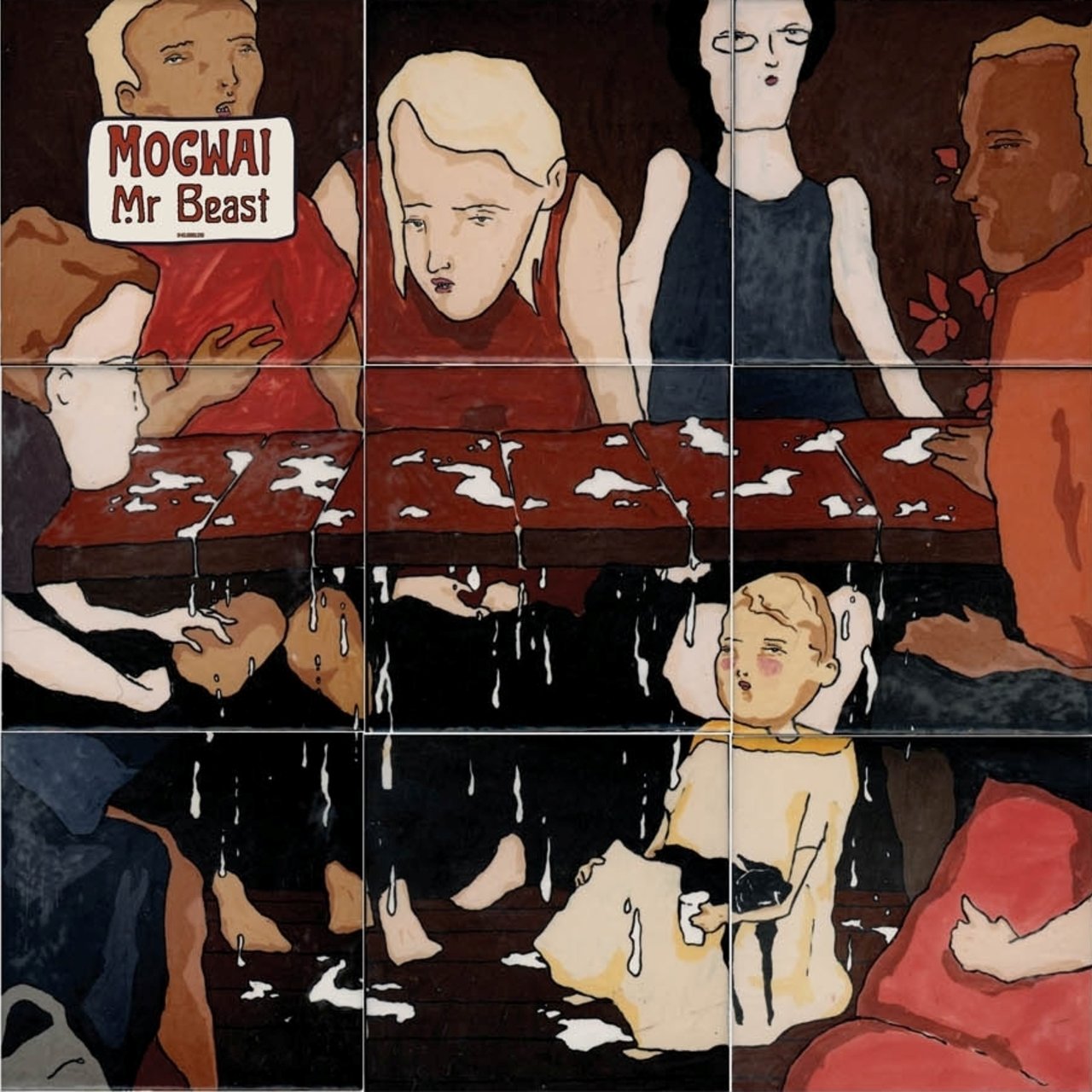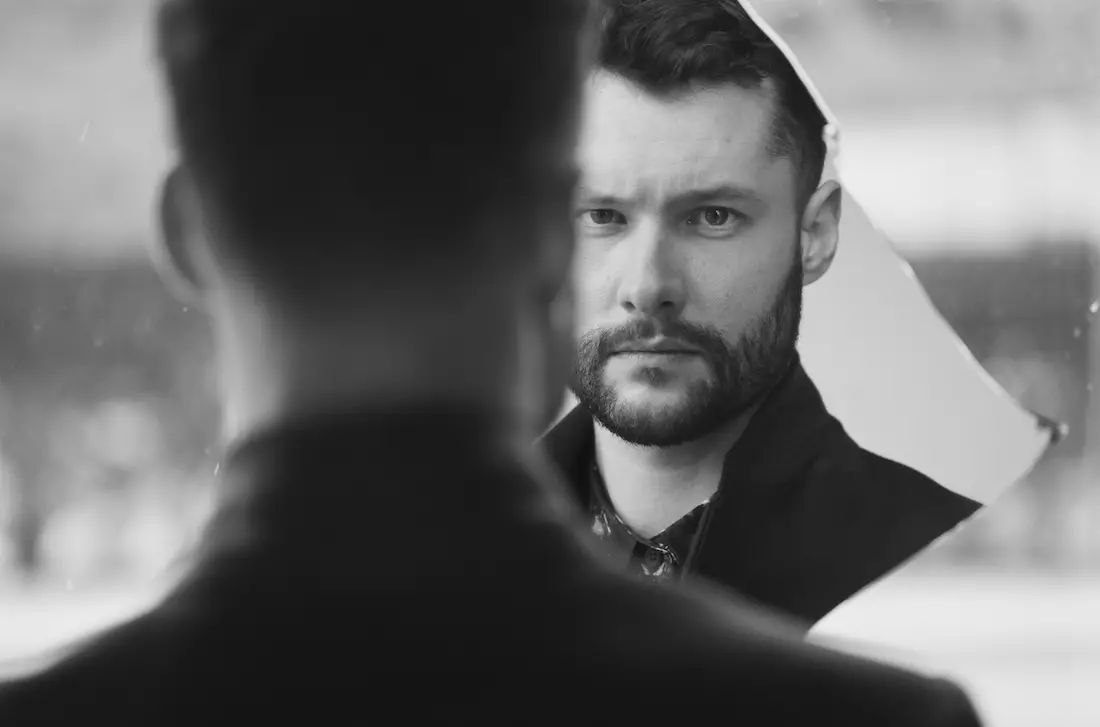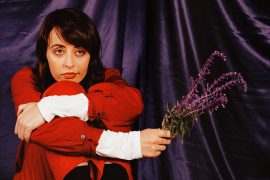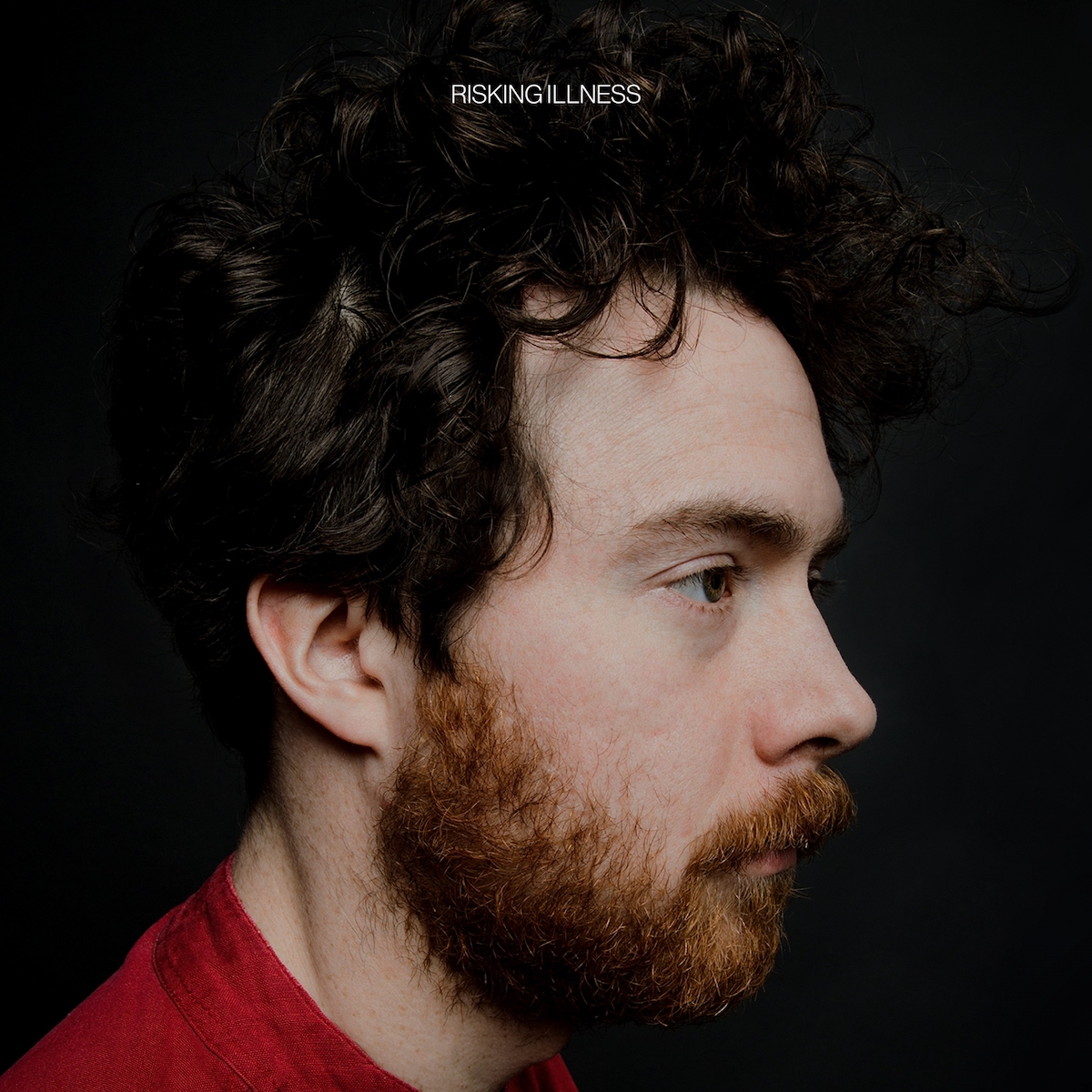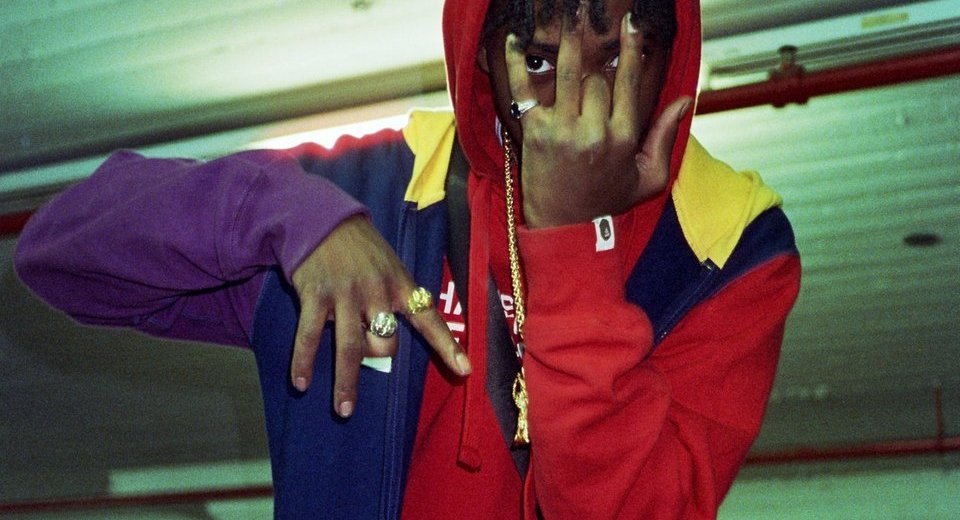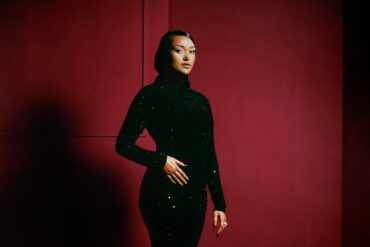COIN’s Chase Lawrence and Ryan Winnen sit down with Atwood Magazine for a candid, decade-spanning conversation about chasing naïveté, embracing vulnerability and self-acceptance, making songs out of love (rather than fear), and the band’s triumphant fifth studio album, ‘I’m Not Afraid of Music Anymore.’
‘I’m Not Afraid of Music Anymore’ – COIN
We’re saying what we mean and meaning what we say, and we’re getting closer to each other.
Vulnerability has always been the name of the game for COIN.
For nearly ten years now, Chase Lawrence and his bandmates Ryan Winnen and Joe Memmel have thrilled audiences around the world with their impassioned, intimate, and invigorating songs. Formed (with former member Zach Dyke) while they were all students at Belmont University, the Nashville band has emerged over the past decade as one of indie rock’s modern torchbearers, steadily growing a beloved, acclaimed body of work that consistently hits hard and leaves a lasting mark on the ears, the heart, and the soul.
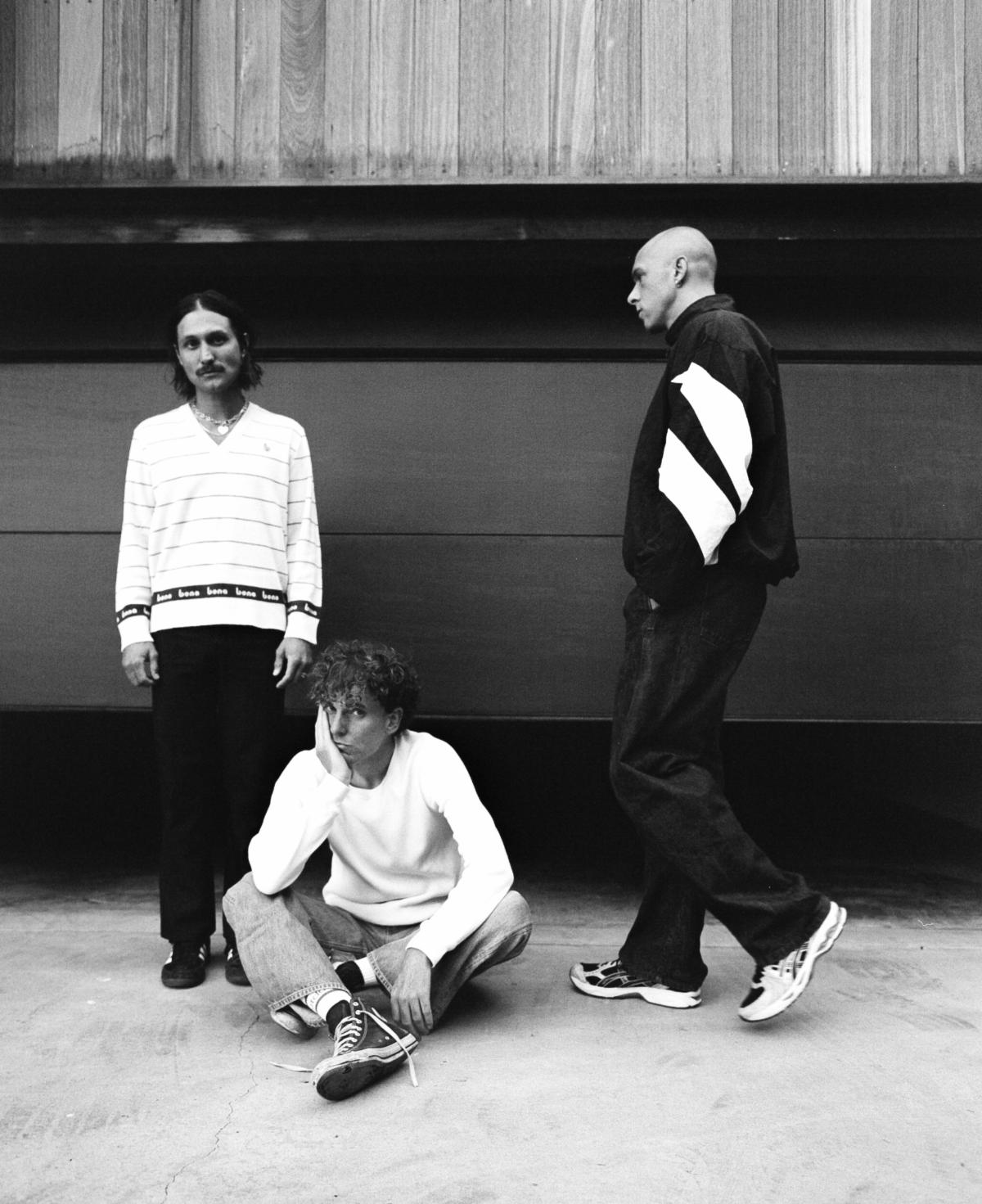
Read any one of the seven (now eight!) interviews Atwood Magazine has conducted with COIN, and patterns start emerge: Namely, that the band have always been chasing some sort of lofty, ever-elusive ideal. Both Lawrence and Winnen are self-proclaimed perfectionists, which not only has resulted in countless hours in the studio and hundreds, if not thousands, of demos that will never see the light of day, but it also has granted the band the patience and care needed to make a good song great.
And at this point in their career, COIN have plenty of great songs – many of which attempt to capture a slice of our shared human condition. From the brutally honest self-awareness of “Talk Too Much” to the haunting vulnerability of “You Are the Traffic,” the enduring heartache of “Valentine,” and the tenderness of “Malibu 1992,” the band’s best moments have been when they abandoned all pretense and let their truest selves – their inner lights – shine.
COIN’s fourth album, 2022’s Uncanny Valley, was (loosely) about what it means to be human. “I made a playlist of worldwide chart dominating hit songs that I would be proud to have written, and the common thread through all of them was that they were essentially one hit wonders,” Lawrence recalls. “And so that sent me down a path on Uncanny Valley, where I met Julian Bunetta, who’s an incredible just producer and songwriter and just a powerhouse in himself. And he consciously creates music for the world. I needed to chase this conviction because that playlist illuminated something in me… It was so fun and unlocked such a cool part of my brain, and I’m so thankful that people afforded me the opportunity to experiment. But going back to that playlist at the end of that cycle, I dug deeper to understand it myself – like, what about these is it? And I think these songs, they’re lightning in a bottle.
Going into their fifth album, Lawrence and his bandmates took an opportunity to reset.
“We were like, we’ve said everything we wanted to say, we’ve made music for the world, now what does it look like to just come back and really make it for ourselves and really say what we wanna say and mean what we wanna say?” the frontman tells Atwood Magazine. “That’s been the greatest honor, to come back around the loop, where you start from, where you have this beginner’s luck, and you come all the way around, it’s almost like you meet back where you started, but you have all the experience and all the tools of the trade only just to abandon them. This album was such a victory lap for us and such a celebration of making music in the same way that we did, actually, when we first started, where there were no tricks, no tips, no tools, just pure love and just three people making music for the sake of making music.”
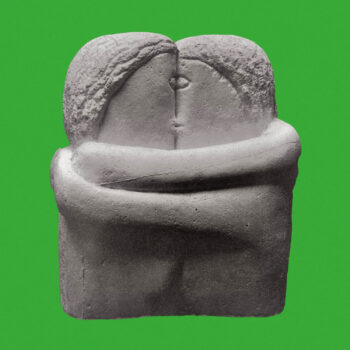
The more you grow as an artist, the greater the expectations – the more voices inevitably enter the room, the more pressure there is to live up to (and do better than) your past, and the more there is to lose. COIN boldly and bravely shut out all the noise and made the music they wanted to make, and the music they wanted to hear. Released September 13, 2024 via 10k Projects, I’m Not Afraid of Music Anymore presents COIN at their freest, their most candid, and their most self-expressive. It’s an honest, unapologetic record that finds strength in vulnerability, blending catchy and cathartic music into one powerful, all-consuming vessel of radiant energy and raw emotion.
And it was made without expectations, with no outside pressure or prying eyes; just three best friends playing music together, and playing their hearts out.
New ending
It’s beginning now
Flip the script, cut the blinds
Read your mind and spell it out
I’m the tin man
With my heart in her hand
Romanticizing, who am I then
If I can’t understand?
We made less sense
Than a horse in Hollywood
Everything felt stuck now
But somehow it goes
Hey, I made it up to you
Yeah, what have I been through?
Just keeping me along for the ride
Hey, just say it to my face
Don’t drag it out this way
You fool me and keep me along for the ride
“For the longest time, the working title of this album was The Kiss — the intention being a conceptual snapshot of honesty and vulnerability,” Lawrence reveals.
“About three weeks into recording the album, our producer’s six-year-old daughter came to visit us at the studio. While there, she recorded a little background vocal on a song. After finishing singing, she took her headphones off & yelled, ‘I’M NOT AFRAID OF MUSIC ANYMORE!‘ We thought to ourselves… what an odd thing to say.”
“Two months after leaving the studio, I found myself working on mixes and feeling underwhelmed by the picture of ourselves we’d captured. While hitting tennis balls against a wall in January, I listened to the whole album top to bottom for the first time ever. I cried my eyes out on the court. I had been looking at this music (and my life) with such unforgiving eyes – paralyzed by this abstract thought of what it could be, while completely ignoring the beauty of what it actually IS. I’m not afraid of music anymore because we are not afraid of where we are anymore.”
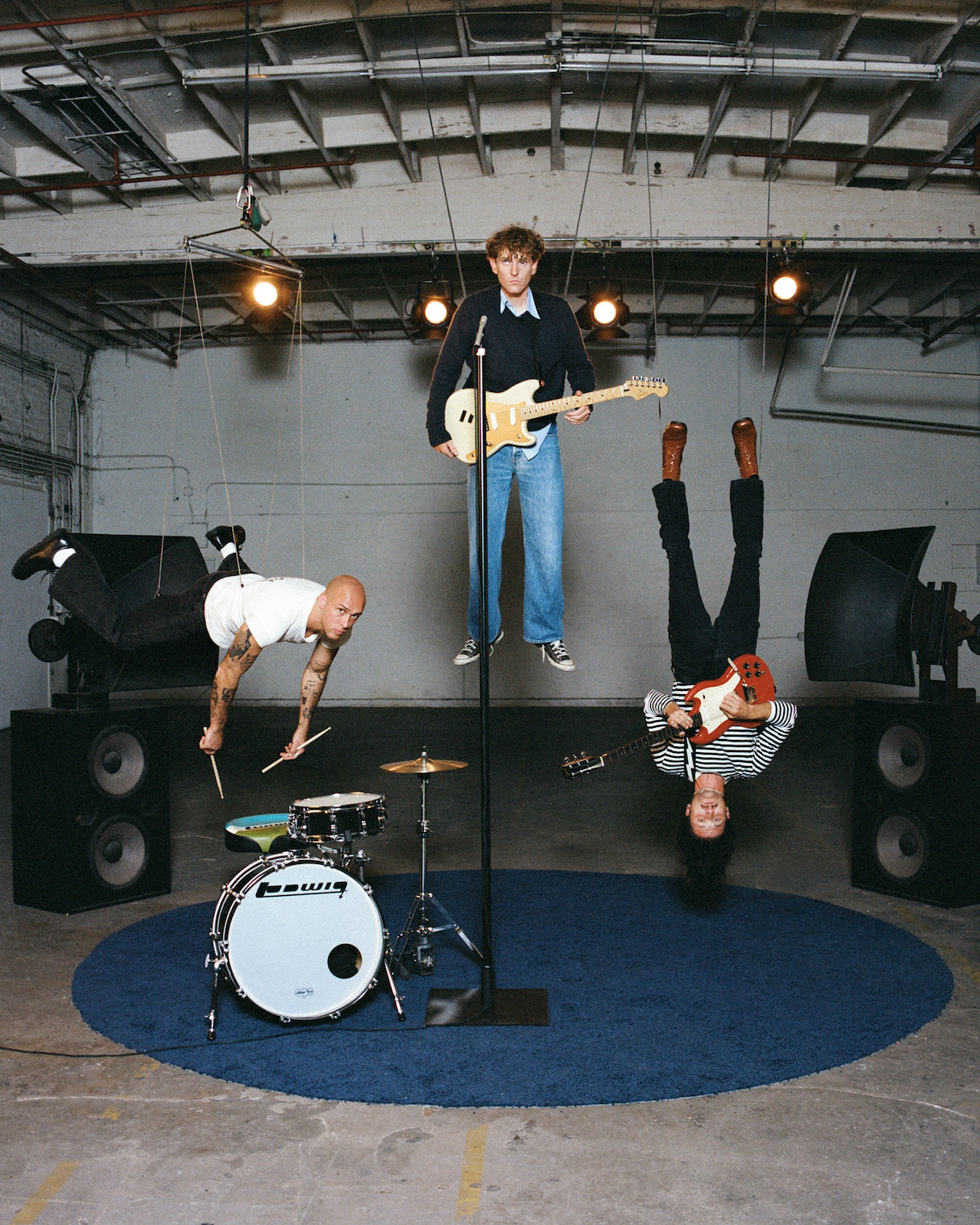
For COIN, I’m Not Afraid of Music Anymore embodies everything they’ve been doing for the past ten years together – and not just because it gets self-referential at times.
The songs themselves are simultaneously loud and soft, intimate and in-your-face, sonically and emotionally charged, uncompromising and unfiltered. From the opening salvo of “It’s Hard to Care About Everything” through to the captivating finale “Leaving a Light On,” COIN expose their hearts and souls, reflecting on life’s highs and lows, what it means to accept yourself, and the things we as individuals need not just to survive this life, but to actually thrive from day to day: Love, friendship, empathy, hope. A shoulder to cry on; an ear to listen; space to fail; room to grow. “Now I’m owning my mistakes, baby, how did it get this way?” Lawrence sings in the gentle confessional “Sing Along,” wondering aloud in the chorus, “How many times can I be wrong? I’ve been down for way too long. How many tries can I fit in a song, hoping you still sing along?“
It’s rare that music can feel so resolute, and still so vulnerable; this authenticity is COIN’s best trait, and it’s one that permeates throughout all of I’m Not Afraid of Music Anymore‘s fourteen tracks.
For his part, Lawrence is proud of what he and his bandmates have accomplished. “It’ll find the vessel it’s supposed to rattle, and even if that takes a decade, even if that takes five minutes, or if it never happens, I know that I would rather objectively go out and fail for being myself rather than never having tried it in the first place, so I feel like this is just our most vulnerable, our most authentic effort yet. And I’m just so grateful for anyone and everyone that’ll listen to it… It’s been so self-gratifying making this.”
“I guess I just have to believe that someone will feel the same way I felt, which is that it’s okay to be yourself and it’s okay to love yourself and it’s okay to be okay with the decisions you made, even though they wouldn’t be the ones you make today,” he adds. “It’s never too late to be the person you want to be. And I feel like that’s how I feel about this album, and I hope that somebody else will reflect that as well.”
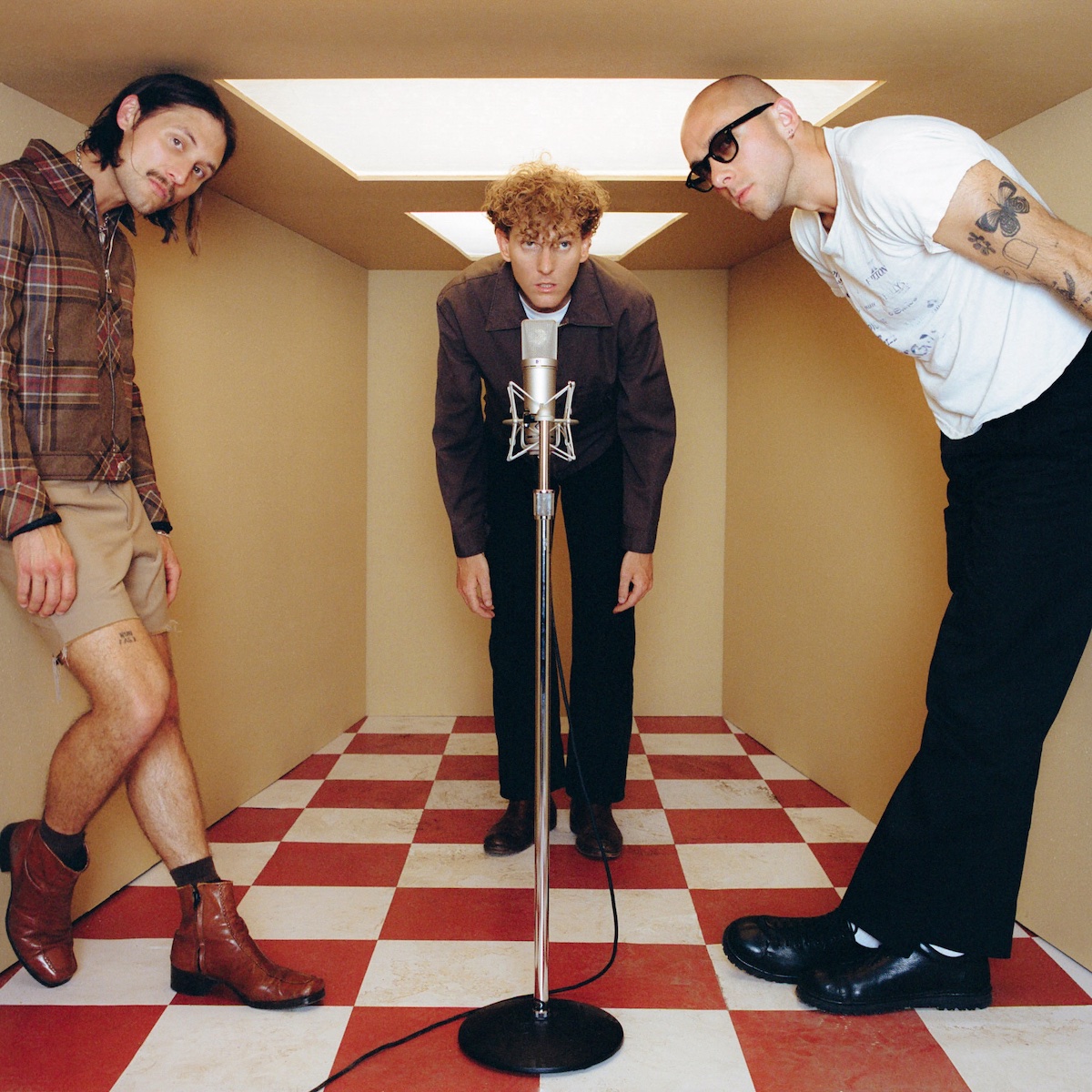
This felt like such a huge step for us to just make music out of the love of it instead of the fear of it. And I feel like love always outraces fear.
Atwood Magazine recently caught up with COIN’s Chase Lawrence and Ryan Winnen for an in-depth, decade-spanning conversation about chasing naïveté, embracing vulnerability, making music out of love, and the band’s triumphant fifth studio album. Dive into I’m Not Afraid of Music Anymore in our interview below, and catch COIN on tour this fall – find tickets and more information at thisiscoin.com!
“We’ve already won by making something we’re proud of; I get to hang out with my friends and do all this great stuff, so everything else is just infinite cherries on top,” Lawrence smiles.
“I just cannot express how grateful I am for this opportunity to have made this album with my best friends in the world and to continue to get to know them better. It’s such an honour to be able to do this for a living – making a living out of art is crazy, but making art out of a living is even wilder for me. So it’s just such a win, in such a huge, beautiful way.”
Time will surely confirm what this writer already knows to be true: That I’m Not Afraid of Music Anymore is COIN’s best album yet, and that as they enter their second decade, COIN have never sounded more confident, fearless, and self-assured.
— —
:: stream/purchase I’m Not Afraid of Music Anymore here ::
:: connect with COIN here ::
Stream: “Slack” – COIN
A CONVERSATION WITH COIN
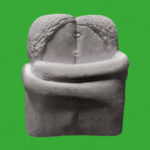
Atwood Magazine: It's wild to me to think that I've been listening to COIN for nearly 10 years now. 2015 will mark a full decade of your band. Did you ever think you’d get to this point, and what is it like to look back on a full nearly 10 years’ worth of COIN?
Chase Lawrence: Man, it’s funny timing. I feel like each of us could explain this in such different words, but I had a cool experience of… So I spent most of my time in West Virginia with my family, where I’m from, and I went to Nashville just for a couple of days this week ahead of some rehearsals, and just had a very nostalgic day where I was on the college campus where we all met and kind of went by our dorms and saw a lot of old faces and drove past places where we played our first shows ever, and was just kind of like flooded with this idea that was like, man, we came here, all three of us came here with absolutely no idea of what was to come except the ambition of just wanting to play music more, whatever that looked like.
It’s almost like one decision has stumbled its way into another into another, and I think that in combination with our song “Slack,” which is such a tour of everything that we’ve done as a band – it’s self-referential, it’s the opus of what COIN is and has represented over the past nearly decade… I don’t know, it’s bizarre, it doesn’t feel like 10 years, but at the same time, looking at all of those decisions and hearing all those decisions at once, it’s overwhelming for me. So I don’t know, I’ve had a week of gratitude. You’re catching me on a very cool wave – and it feels like the past year has been that for us. It’s so cool that none of us set out to do anything, and we’ve gained so much more than we could have ever bargained for. So I don’t know… Ryan, what do you think?
Ryan Winnen: I think that I’ve been having similar experiences, just because I live here and I drive past places all the time that remind me of getting off of a shift at a coffee shop and meeting up at 3:00 or 4:00 PM, whenever Chase and Joseph and Zach, who used to be in our band, would come to the house that we were living in. And we would just play music until midnight, and then everyone would wake up early and tend to their life again and then come back. So I feel like I’ve recently been reminiscing about our sort of garage band story and realizing that it couldn’t be more kind of quintessential to what it’s like to start a band. And rather than see that stereotypically, I’ve just been grateful for the fact that that story has been written so beautifully.
And that’s even before you get into the nuance of what it means to be connected to these guys and to love them and to know them truly over so many years. So I think when I think of years that have passed and now looking about 10 or so, it always brings a tear to my eye. And it’s just, it’s impossible not to. But making this record in the way that we did and kind of just looking at each other, sitting in a circle, not judging each other for our parts, not judging each other for things that might have bugged us about each other’s playing or whatever five, six years ago, it’s just felt like a total kind of catharsis. And I’m just grateful to be here and doing it with Joe and Chase for as long as we have.
How do you feel you've actually grown musically over the past ten years? What are you most proud of in terms of the artistry that you've been able to uncover and explore over a decade of making music?
Chase Lawrence: Every time we do an interview before an album, I feel like we always talk about chasing that naivety – and I think everybody kind of romanticizes those early years of being a band where you didn’t know any better and you just created out of ignorance or love or, you know, whatever that is. And there’s just this sort of freedom. And I feel like for a long time, every album, we feel like we rediscover a piece of that, some corner of it.
I mean absolutely no offense to any record label, but someone comes along that “knows better than you” and has been in the field longer than you, or is older and is wiser and tells you how to refine something, but through that distillation, through that refinement, you lose a piece of yourself that was so clear to begin with, and it just gets a little blurrier. Even though it’s becoming a little clearer, it gets a little blurrier, too. And I think that going through so many phases and making the last album the way we made it, which was kind of collagey and very singular and, I don’t wanna say “for the world,” but it wasn’t as much for us, it didn’t feel like as much as we were trying to, you know, it felt like “connect with our audience” or “connect with people outside of ourselves.” And maybe that’s a post COVID symptom. But now, through that, we were able to, I don’t wanna say swing the pendulum in a negative way, but in a way that like it felt like we had an opportunity to reset.
And we were like, we’ve said everything we wanted to say, we’ve made music for the world, now what does it look like to just come back and really make it for ourselves and really say what we wanna say and mean what we wanna say? And so I think that that’s been the greatest honor, was to come back around the loop, where you start from, where you have this like beginner’s luck, you know, and you come all the way around, it’s almost like you meet back where you started, but you have all the experience and all the tools of the trade only just to abandon them. And so this album was such a victory lap for us and such like a celebration of making music in the same way that we did, actually, when we first started, where there was no tricks, no tips, no tools, just pure love and just three people making music for the sake of making music.
And yet, I get the sense that if I were to ask you if you could have made I'm Not Afraid of Music Anymore back in 2014, 2015, you'd say absolutely not. Why did you have to be a band for 10 years in order to make this album? Why couldn't you have made this album back when you were first starting out?
Chase Lawrence: I mean, I think we should both answer this question, but for me, it had a lot to do with personal growth and confidence and being okay with, you know, the cards falling or the chips falling where they fall and realizing that winning is subjective and an artistic endeavor is not, you know, there are no objective rules in this game. And I think that I was so driven by this ability to provide for… We were driven by this idea to provide for ourselves and make something worth making. And, you know, you could… And you have to have that spine when you start and I get it, to get it off the ground. But at the same time, it’s like, we were also, there was no promise of anything in the future, you know, it’s like… And I think that, so it’s, I guess I’ll say in 2014, we couldn’t make this because it’s a privilege to be able to make an album where you’re okay if no one listens to it.
And it’s a privilege to make something for the sake of making it. And so that’s my biggest thing. And also just being confident in the fact that like, I know this is amazing, I know I love this. And it’s like, I’m going to keep resonating at this frequency and it’s going to find the vessel to rattle. And if you know, and whoever or however many people that is, that’s for the universe to work itself out with rather than trying to retrofit the note to rattle the most vessels. It’s just like something that personally is not… Is something that I had to go through emotions to understand that is not truly fulfilling to me. Ryan, what do you think?
Ryan Winnen: Yeah, I think to echo what you said about life experience, I think for me, we needed it to remember that making music is a form of like expressing yourself, rain or shine, and the feelings that you hold about the life that you’re living can actually be transmuted in this environment. And I think that with any level of commercial success, that can be very easily splintered, or at the very least, compromised. So I think I’m just learning how to remember that music is this sort of, it sounds cliche, but it is this sort of form of expression that instrumentalists, like we get so good at the stuff we do, we play all these shows in front of people and it becomes about this sort of like, okay, it’s game time, we’re going out onto the field in the next five minutes and then we’re gonna get on the bus and we’re gonna shower and we’re gonna go to bed.
But I think remembering that before we do any of that part of our job, there’s the opportunity to sort of express nonverbally. And of course, like we write lyrics and we sing these songs and Chase gets up there with a microphone and we communicate that way but initially, I think our band was very nonverbal. It was like, it was so much about just like what the music sounded like when the three of us played together and it was so pure because we didn’t know how to filter each other. And I think that making this record now was the first time that I’ve, at the very least, in my own life witnessed that lack of filtration and sort of embracing of what is, not what we are supposed to be or what we convinced ourselves we were supposed to be because people started catching on and listen to our music. So while we’re grateful to have all those people, I think, as Chase said so beautifully, it’s like, it had to be about us this time, so grateful to have made it.
This album has been described as your most vulnerable work to date. Tell me about the title, I'm Not Afraid of Music Anymore.
Chase Lawrence: So the album, for the longest time, the working title was called The Kiss, and through, which is why we used the Brancusi sculpture, which was just the working artwork that we just ended up using. And I think that so much of this process through levels of pseudo-therapy actual therapy, and just, you know, just getting knocked down by life experiences, whether that’s like family issues or, you know, just truly just like coming-of-age stories, none that are atypical or rare, just some, just things that are happening while balancing a career. And at the same time, I feel like we kind of became distant from each other. And again, this could be a symptom of COVID as well. But through the process of this album, I feel like, you know, kissing someone is obviously very vulnerable. Connecting mouths is in some ways disgusting, but also simultaneously beautiful. And I felt like this album, at least through this catharsis, was our version of literally kissing each other. And it felt like just seeing each other for who we were.
And again, sweeping things out, taking things out from under the rug that we put under there, tucked them away in rooms of the COIN house that we just were like, they’re better to look at over there, you know, and then we have a perfectly manicured living room for the public to see. And we’re taking this stuff out and dusting it off and talking about it. And through that process, again, we’re saying what we mean and meaning what we say, and we’re getting closer to each other. And yet, we’re still so scared of what each other thinks, what our fans think, what our parents think, what the world thinks and just scared of failure, scared of falling short, scared of dreaming too big, scared of anything. We were so united on this front. Even though our fears were maybe different, we were walking lock and step in fear.
So we’re making the album, the album’s called The Kiss at this point. We’re at RCA Studio A, and Gabe’s daughter, who produced our album, not his daughter, that’s an amazing idea, though, she’s five. Anyway, Gabe, our producer, his daughter, she sings on a song. You know, there’s John songs, there’s Paul songs, there’s Ringo songs. Well, there’s Ryan songs, there’s Chase songs, there’s Joe songs. And this is a Ryan song. And it’s always been, I’ve always had this idea that I don’t wanna let Ryan down. We’ve always said… We have this thing where we always wanna live up to each other’s expectation. And so I’m the person that’s kind of like has the keys sometimes to the car and have the steering wheel a lot of times, even though if their hands are on it, it’s like I have my death grip on it. And so I’m just tense and nervous. And I’ve known this idea that it wasn’t about the pressure, it was about the joy of it. But it’s like, I couldn’t let go. And anyway, emblematically, Gabe had his daughter sing on one of the songs called “Along for the Ride.”
And she just sings a simple hey, and she just, again, five or six years old. And just like, after she’s finished in like this beautiful, almost famous Vista, she takes off the headphones and goes, “I’m not afraid of music anymore.” And I was like, “Oh, what a weird thing to say.” And, anyway, so after a few months, though, it was still called ‘The Kiss’ and whatever, you know, we were… And then I got all the music down, all the… They weren’t even mixes at this point. I don’t even think, Ryan, like they were just made like, they were in the boarder of mixes. And I was able to listen on an app called Untitled, which is so cool because Dropbox, you consciously click the link and actively like listen, and you know, you’re so conscious about it. And so Untitled was so cool ’cause you can listen like a passive listener. And I was able to just put the album on and just listen all the way down.
And by the time I got to the last track, track 14, honestly, I was crying so intensely. And I just realized that I had spent so much time personally worried about what I could get from it, rather than what I could give to it. And at that moment, her words echoed in my mind. And I was like, oh, like, it’s a perspective change. Like, that’s what this album is about. It’s about conquering that fear. It’s about not just being afraid, not afraid of music, it’s about not letting fear control me at all in any artistic endeavor but regardless of that, even bigger than that, in life.
And I’ll tell you what, everything in my life started to flip at that moment. This is the second day of January, it’s January 2nd. The night before, actually, we in a circle, me and my friends, we kind of went through our memories of the greatest highlights of the year. Everyone was sharing great memories and mine were kind of morose, dripping in fear a little bit. And I had that moment to recollect on that and had that moment of listening down to the album the next day and I was like, “Oh, I’m not gonna let fear control me.” And so anyway, out of the mouths of children, I feel like this is what we were talking about, this is that naivety. And emblematically, that echoes exactly what the album is all about. And we’re just always chasing that naivety, and this felt like such a huge step for us to just make music out of the love of it instead of the fear of it. And I feel like love always outraces fear.
This album, at least through this catharsis, was our version of literally kissing each other.
This isn't true for all the songs, but “Along for the Ride” is a good example of it, “Take It or Leave It” is a good example, and maybe “Strawberry Jam.” There's a looseness and a lightweight feeling to this record. There's an easiness to it that I haven't always felt in past records. What was your mindset about these songs? Did you have a vision going into this collection, any sort of rules or ideas that you were trying to follow when you were creating this record, following up Uncanny Valley?
Chase Lawrence: I don’t wanna say rules, but definitely there was a conscious effort to tap into our sub-conscious. And definitely, and I think that freedom you’re hearing though and that looseness is, one, that’s Gabe not allowing us to inhibit ourselves and not allowing us to kind of tinker and tweak and that’s for me, really, more than them. And that’s making music live, and even down to like… I mean, I produce music oftentimes on my own too and I’m not like a loop man. I’m not making electronic music by any means, but I’m definitely a believer in saving time and getting to the meat of the idea in the fastest way possible so you don’t lose the spark. And Gabe is the exact opposite. Gabe is like, “No, you get it right and you play it all the way through.” ‘Cause ‘Uncanny Valley’ is exactly an example of the former, which is this idea that you just keep as much as you can from the initial spark so that the idea can live in its initial inception.
And Gabe is like, “No, if the guitar part is a single note for the entire song, then you need to play all four minutes of the song one note.” “Strawberry Jam” is a great example of this. One guitar probably goes, the entire song is just one note. And it’s just me playing one note for four minutes straight. And I was like, “There’s no way this makes a difference.” I mean, we gotten just crazy odds at each other, and I was like, “There’s no way this makes a difference.” And sure enough, I don’t know if it does make a difference actually psychologically or to a listener, or psychoacoustically, I guess, but to me as an owner of the art, I can’t tell you how much more pride and ownership I have over it. So I feel like, I’m such a believer in this idea that what you put into it is what you get out of it.
And how you do anything is how you do everything. And we were so intentional about putting in joy, putting in love, whenever we wanted to put into it, we wanted to get out of it. And so I think in times past before, it was like, you put in these conflicted emotions, maybe it starts with love, but then somewhere along the way you’re like, “Oh, what if more people heard this? What if we cut this out so we keep people’s attention.” And suddenly, you’re at a place where it’s like, oh, if you’re putting conflicted emotions into this, you’re gonna attract conflicted feelings, too. And so we were just so unified together in this idea that… It’s almost like unity and chaos reigned together. And I think that’s what it is and I think because it’s so simple, because it’s four instruments at a time, these things can kind of exist together.
Nothing gridded, nothing really loved, nothing really tuned, maybe a couple moments were touched up but for the most part… I was talking to Mark Needham about this the other night, I saw him at a concert and we were talking about recording vocals as a singular take, which is again, this idea that recording a guitar part all as one. But it’s almost like, not to use a tennis analogy, but you can’t start a tennis match in the third set. You have to start from zero and then work your way up to the end and then win. But this idea that we were like, “Oh, let me track all the verses, let me track all the snares.” And not that you can’t make amazing things that way, but our intentionality was like, there’s something special that happens when the three of us get together and we have to embrace what that is. Yeah, and through that, it created something that was so elementary, but at the same time, it was just that we perfected the recipe of what it means to be COIN, at least in our eyes.
You said in an interview last year that Uncanny Valley was about what it means to be human. So is this album what it means to be happy? How would you describe this record?
Chase Lawrence: I think, yeah. And I haven’t stopped to think about this, I don’t know. I think what it means to accept yourself, I think it’s really what this album and this past year has been about. It’s just been about self acceptance, and I don’t wanna say confidence but just this security that comes with being okay, with being yourself and it’s like a joke, it’s like a bit we go into, but it’s like this idea that this is house money. Like we’ve already won by making something we’re proud of. And anything else that happens, I get to talk to amazing people like you, and so we get to coordinate this stuff. And I get to hang out with my friends and do all this great stuff, like everything else is just infinite cherries on top. So yeah, I think it’s just about what it means to accept yourself.
That's amazing. We don't create in a vacuum, and you've been pretty busy working with some other friends of mine, from the good folks in Valley, to The Greeting Committee and I'm sure many more that I'm leaving out. What's your experience been like as a producer and collaborator over the years – in helping others bring their own visions to fruition? And does any of that filter back into COIN's music?
Chase Lawrence: For sure. Definitely. I mean, I owe any future production and collaboration to this band and to the hours that we’ve logged in together as the three of us ’cause iron truly sharpens iron. And whether they’re physically in the room with me, which they make their way into a lot of collaborations I do, they’re always spiritually with me. And if I’m playing the drums, it’s ’cause I’ve learned how to play the drums from Ryan. And same thing with the guitar. And melodically, I hear them in my head at the same time and I think the same is true for them when they collaborate with other artists too ’cause they’re doing more and more of that as well. But this album for me was absolutely life changing. And it was crazy ’cause I think Rob from Valley, I think they called me while we were in the studio making this album. And this album, it just opened up my mind to understand what it means, like Ryan said earlier, to make music and artistic expression again.
And I think that they were in a similar place to us where it just felt like very mechanical and very just going through the motions, you know, just to keep the machine alive, basically. And so, yeah, this album was truly, I mean, I loved producing before this, but now on the other side of this, I understand what it means to make music again. And so, yeah, they’re directly, they work in tandem together. But on the other side of this, I’ll just say, like, I’m definitely a changed individual. I don’t wanna say evolved because I’ll probably laugh at that in a few years, but I’ve definitely, I’ve shed some skin. And again, it’s just this idea of acceptance and in saying what you mean and meaning what you say. I think for a long time, Gabe told me this too, where I kind of wrote, I don’t wanna say like Stephen King, but, you know, I fabricated stories to make them either more relatable or less true to my own life, maybe ’cause I was nervous to show a window into who I am truly.
Or I would just throw things out there because it felt like… I’m sorry, where’s that coming from? Oh, or I would just throw things into the story for the sake of the story or whatever it might be or just say something ’cause it phonetically sounded nice, which is, you know, there’s nothing wrong with these things. But Gabe said to me, how jaded did you have to become to think that people didn’t care about what you had to say? And that was one of the first days of making this album. And that’s when I realized that the words that come out of our mouths are so important and they’re so valuable and I wanna treat them as such. And, yeah. So, and that same kind of philosophy is with me with every artist that I’ll collaborate with in the future too. So, yeah. That’s a fun question, though. Thank you.
I want to break down this fourteen-track album a little bit. What are some of your favorite songs? When you talk about this album, you didn't say ‘it broke me,’ but you kind of said this album ‘made me a new person.’ What are some of the songs that really did that – and was it the act of making it, or are there specific songs that really were ‘aha moments’ realizing this is something new, something you haven't done before?
Chase Lawrence: I don’t think there’s nothing I hadn’t done before. I think everything was actually the most easily accessible to me at all times. And a lot of these songs just feel like turning the selfie camera on and just like talking. And I think “222” is the best example for me of my most or our most uninhibited self and just a song that you put on and you just like, I feel like I’m inside of my own brain. And it’s so fun to like, it feels like inception, like living somewhere that, or showing someone I guess what it feels like to be inside of my brain and its truest most uninhibited form was just, it’s such a huge step for me. Again, it’s funny ’cause I had made that song even ahead of making this album, or at least the crux of it, and it was made on February 22nd (“2/22”) and yeah, this is what the Pro Tools folder was called.
I barely remember making it, starting it at least. I just made it, and never with any intention to show anyone. And that kind of spawned this idea of being like, oh, what does it look like for me to make music that I don’t even care if anyone listens to? And I know that sounds, maybe sounds selfish, but I think through that, though, I think you truly… We adopted this idea that the most personal is the most universal. Not that we needed anything from it, but it was rest assured in this idea that we are true to ourselves. Like, if you build it, they will come. It was never on our mind in that way, but I think that song is such a huge win for me in that way.
And that spawned so many more songs like “Take It or Leave It,” or “It’s Hard to Care About Everything,” which is the opening track, which is such a song that’s just the most… like it is no one else but Ryan on the drums. It is no one else but Joe playing that guitar part. It is no one else but my vocal processing and my words. And so you’re right, we don’t create in a vacuum, but almost… this album does kind of feel in a way like we could have called it vacuum, actually. It’s funny. Yeah, that’s kind of what it feels like in a way. So very astute. Not to go track by track – because every song I can go on and on and on about – but those are the ones that I think about when I think of what started to really connect our talent to our heart again.
“It's Hard to Care About Everything” opens the album with you singing, “Charlie works at the cafe burning double chips right to his grave, but hey, that's just what it, just how it shakes.” Those are the first lines we hear on this album. Tell me about this entrance and this song; how do you set the scene here?
Chase Lawrence: Yeah, well, Charlie, there’s a studio, it doesn’t exist anymore, but there’s a studio we always worked at to write when we first started writing for a new album. We’ve done this for every album now. And we always do our first songs back together at the studio. I mean, it was not intentional, it did not become a ritual, it’s just how it happened. And this guy who owned that studio, his name’s Charlie, and it’s just in his house, this is in the back of his house. And unfortunately, they sold the house now, which is really sad. But I’ve made a lot of great songs there. “Talk Too Much,” “Chapstick,” “It’s Hard to Care About Everything,” “Slack”… The list goes on, really. Some Adam Dissett stuff, some Valley stuff, a lot of stuff.
So it’s a special place for us. But it just felt like, was like, wow, we got to work… This is before we knew we were even making an album yet. We’re like, dude, Charlie’s got to end up in a song. He’s taken care of us for years. So, and then, and yeah. And then I think we just took the tour of just thinking about Joe used to work at this like, in Grimey’s Record Store there used to be this coffee shop in Grimey’s. I don’t think it’s there anymore. And he would literally, like, work at the record store and be like pulling shots of espresso simultaneously. I was like, I’m pretty sure there’s like some labor laws that they were violating. And, but yeah, it’s very much like a tour of kind of Nashville.
And that’s where we made the stuff. And, but it had to do with this idea of this duality that we all live in. And like, you know, work at this cafe that says they care for their employees. And these people, it’s like, that’s how the world goes, and yet they’re still breaking their back trying to make rent, you know. And that’s kind of opened this up for this album, which is like, we’re all doing the best we can with the information we’ve been given. And nobody’s trying to blow it, you know? And I think that’s like, that’s so much of what this album is about, too. It’s like, let’s just, let’s do our best with what we know so far. And yeah, that’s nice.
You debuted earlier this summer with “Strawberry Jam.” Why that song as the lead single? Any special reason?
Chase Lawrence: It’s impossible to sum this album up in singles. Like, I think it’s so weird, it’s such an album. No song was written… I think there’s a huge reason why this album is called ‘I’m Not Afraid of Music Anymore’, too. I remember us walking around Sylvan Park, the three of us, close to Gabe’s house, and we were just walking around. And I was just like, “I’m just not scared of any song on this album. There’s not one song that scares me.” This is before we had the title or anything. And they were like, “Well, maybe that’s a good thing.” And I was like, I don’t know. I’ve always had this pit in my stomach before, like a song like “Talk Too Much” or “Chapstick” came out, it’s like, I’ve always felt like so scared of it.
Gabe had us make a list, this is a little off topic, of just like the songs that I would show a stranger in our catalog – not necessarily the recordings, but the songs. And there were about five of them. And all of them were the most, I don’t wanna say the most ‘tattooed,’ but just the most meaningful and the ones that I felt made me feel the most comfortable, the shows, and I could see it, they were the most meaningful to people as well.
Not that I’m not super thankful for songs like “Talk Too Much” or “Chapstick,” obviously, so grateful for those. But I think, again, this is what goes back to this idea of this album being a privilege to make, which is, you know, we have this security and why shouldn’t our music reflect that security now? It feels disingenuous to be, I don’t even know how to say it, but like reaching and I don’t mind to put effort into something, but our conviction just didn’t lie there this time. And not to say it won’t, but it’s just, that’s, a huge motivator for us was just trying to figure out where our conviction lies. And that’s all we’ve ever tried to do, is just chase that conviction. And that’s where truth comes from. And that’s, for this album, that’s where it lies… That’s where it laid.
Do you mind sharing, what were the five songs that you would show a stranger?
Chase Lawrence: “Malibu” is one of them, “You Are the Traffic,” “Valentine,” those are three. I don’t remember the other ones.
Alright, this is going to be one hell of a tangent – but “You Are the Traffic” is my favorite COIN song.
Chase Lawrence: Me too… Maybe.
Get out of here! Why is that the case? Can you tell me a little bit about that track in particular?
Chase Lawrence: It’s made in the same state of mind that “222” was made in. It’s the same heart. You can call it a ‘zone,’ I don’t really know, some kind of meditative state that I go and get behind a guitar or computer or a piano or anything and just kind of just like, kind of lock in and “Valentine” is the same way, and “Malibu” is the same way, where like I just get in place and then come to the band and they know exactly what to do with it. And they kind of lock in to that mindset too, or which fine when I’m doing in a more powerful way. I think that was just, like coming back from the UK, we had just played Reading and Leeds for the first time, I think. And there’s so many great bands, and just like the sound, I just felt like, at Reading and Leeds, I just felt this universal power and it unlocked something in my brain too. I don’t know, I guess maybe it also just stems back to growing up in church too and just effortlessly always just hearing things that felt corporate and unifying. It’s like nature and nurture, they just like meet together and they just shake hands, and I feel like it’s such a culmination of everywhere I’ve been and everything I’ve done. And yeah, just a perfect storm really, and I think that’s… Again, I’m not trying to be “promoey,” but that is the same heart as this album.
It may not sound the same, may not feel the same to everybody, but that’s the exact same feeling and the same mindset that I had in making this album, and yeah, I don’t know, this is a very good question too. I really like that, and I feel the same thing about “Valentine” too, and I know they’re cut from a different cloth, and I know that’s maybe not as meaningful of a song to everyone on the surface level, but yeah, there’s something that happens when my subconscious is truly free and, or my conscious is free I guess, cut loose, and I’m able just to create from a different place.
Was that a song where the lyrics really came before you fully realized what it meant to you and you were able to attach meaning after the fact to who the traffic is and all that jazz?
Chase Lawrence: Well, no, it all came at once… and that’s the same thing. So many songs in this album too, it just wasn’t like that, it wasn’t like we were trying to phonetically fit in different words to make it feel better, it was like, okay, here’s the song, and there’s the song!
So that was a little tangent into one of our shared favorite songs. Going back to “Strawberry Jam,” are there any special reasons for it being the lead single? How do you feel it kind of set the stage for the record as a whole?
Chase Lawrence: I remember when we decided, we all had different opinions about what it should be. And again, we never really could decide fully on one ’cause the album is just the album and we love it for what it is and the whole story it tells together. It’s like a beautiful just patchwork quilt of things. And it’s hard to like take one square and be like, this square is the most special. But it felt like just the harmonica and the idea of what it was saying, which is so true and so vulnerable for me, at least. And it was Joe’s melody originally and Joe’s chorus that he came in with, which is like all a run. And then we made it so collectively, like sometimes, like I said earlier, there’s Chase, Ryan and Joe songs. This was a Joe chorus with a Chase verse and a Ryan post. And we made it all together, the three of us in a room. And so just for the meaning of it, it was just like this is unified.
This is the three of us on display. There’s no other answer, unfortunately. Regardless if it’s the right single or the biggest song, it wasn’t about that. It was just like we have to put this album on display immediately. ‘Cause I… But we just, we love it, too. Just, it’s so fun and it sounds so much like RCAA. It has this kind of like old Nashville sound to it, too. And it was such a cool moment where it all came together. And I’ll never forget the three of us in the studio listening down to the outro and it like fades out in the studio. And Ryan was just like sitting in the corner, staring at the wall and he said, “I got such a fuzzy feeling right now.” And he’s not… He’s gone right now. But I can say he’s not like a person that talks like that so emotionally often. And I was like, I held that dearly. And I was like, I wanna share that with people. And I want people to feel what he felt.
Chase, you and I – and the whole band – are millennials, which means we're children of the ‘90s. We grew up with this music called ‘pop/rock,’ which I've never heard more pronounced than I think in some of these songs. I think of a track like “Problem,” and it reminds me of those bands we would’ve heard as kids. Was there any vision sonically or stylistically that you were chasing at the time? Is it just happenstance, or is part of this freedom that we're talking about maybe going back and making the music that you subconsciously ‘wanted’ to make?
Chase Lawrence: There was an intentionality to track everything live. That’s for sure. And I think that’s a huge thing of what you’re hearing, and that transparency that comes with just having room mics in the room. Third Eye Blind sounds like that in a way too, or even Oasis. You can just hear what a studio recording is. So in a lot of ways, we call this album our first ‘studio album.’ Not that we’ve never recorded in studio before, but it just felt like this is the first time I’ve been able to hear us in a way that I heard my heroes in.
It’s not like we went into it being like, ‘Oh, it’s gonna sound like blah, blah, blah,’ but it’s just what happens when you make music live with your friends in a studio and you capture the room.
I think people don't realise that there's a different energy that you get when you're playing together than when you're tracking guitars separate from bass, drums, and vocals.
Chase Lawrence: Yes. And it was, it all goes together, and “Problem” is such a great example of like, we put a PA, a full sound system in the room, in the tracking room with us, and it was playing back at us like we were at a show. And so the drums, the vocals, the guitars, everything was going through that while we’re playing. So it’s getting recorded in the room with us. So yeah, it maybe is nuanced, but all these little things make such a big difference to make something just to feel that much more palpably human, which was the goal.
They do, and I've been to many a COIN show over the years. I know how much energy you bring to the live show. It's non-stop electricity more or less for a solid 90 minutes.
Chase Lawrence: Yes, so true. And we felt that disconnect in our catalogue, and not in a bad way. We love to make all kinds of music, and we love the art of recorded music, but we felt like it would be such a shame to have never made an album that is more in line with our live show and what came so naturally to us.
You've spoken so reverentially and lovingly about Gabe and his production and working together with him as a collaborator with COIN. Was this his first time working with you guys? Was this the first time you guys had really worked together on COIN music?
Chase Lawrence: Well, no. We’ve known each other for years. Our first tour ever actually was opening for his band, and that was in 2014, something like that. They were called Kopecky Family Band; they went to Belmont with us. So we went on tour with them, and we did like 10 shows with them, and then Gabe, the band kind of took a permanent hiatus, what do you call that, ’cause they just quit. And so they put that on ice. And then Drew, our manager, started managing Gabe as a songwriter producer, and Gabe and I actually wrote “Crash My Car” together and we’ve just known each other forever, and he’s always circled our story and orbited it and Gabe just continued to make amazing music and produce amazing music and most recently produced some really meaningful music in pop culture. And we just happened to just like… He saw us at Hangout, was it last year? Yeah, and saw us at Hangout and he was like, “I wanna write with you.” And so we booked just a few days to write together, three days, and the first day we didn’t write anything. And then the second day we didn’t write anything, and he just made us talk to each other and get into the weeds about where we are in life, not even about music, but he just took notes diligently in his little book and just wanted to know our story deeper.
‘Cause he knew it so well from a superficial level, but he wanted to know the inner workings so he could help us better take that next step, ’cause I mean, to be honest with you, fundamentally we were just lost. And so by the third day, we talked so much together that, I mean, songs just start pouring out and we wrote “Problem” and “Bloodtype” and “Take It or Leave It” on the third day. And after not writing anything for two days, just from literally just making us talk for two days, who knew that’s all we needed, was just to communicate with each other.
And there was just so much built-up resentment. He played the bass on the entire album too, he became essentially the fourth band member. And so I can’t say enough great things about him, but more than I can say anything about his musicianship is I can say that his leadership and his ability to get at the core of us and unravel us and unwind us to make us feel like ourselves again and be better friends and family, that’s truly his greatest strength and something I’ll never be able to thank him enough for.
Yeah, I think I'm a secret Gabe Simon fan… he's produced Noah Kahan, James Bay, Stephen Sanchez, Maren Morris, Lana Del Rey, Medium Build. This man is one of the masterminds behind many of my favorite songs released over the past couple of years, and I didn't know it until just now.
Chase Lawrence: Yeah, he’s great. I love him. We love him.
It's really special when you find somebody that you really gel with.
Chase Lawrence: He’s a special guy.
For someone going into this album blind for the first time, COIN fan or not, what do you want them to know going into this listen, to this journey?
Chase Lawrence: I don’t know. I don’t think there’s a pre-rec. Yeah. I think that we worked, again, it’s this idea that like it’s there if you want it. And yeah, it’s there if you want it. And we… A few years ago, I made a playlist. This is before Uncanny Valley. I made a playlist of worldwide chart dominating hit songs that I would be proud to have written, and the common thread through all of them was that they were essentially one hit wonders. And one song was overwhelmingly larger than the rest.
And so that sent me down a path on Uncanny Valley where I met Julian Bunetta, who’s an incredible just producer and songwriter and just a powerhouse in himself. And he consciously creates music for the world. And I was like, I need to chase this conviction because that playlist illuminated something in me. It was like, oh, no, I need to make things with the intentionality of it, and I was so grateful for the opportunity. It was so fun and unlocked such a cool part of my brain, and I’m so thankful that people afforded me the opportunity to experiment. But going back to that playlist at the end of that cycle, I dug deeper to understand it myself like what about these is it? And I think these songs, they’re lightning in a bottle. The biggest thing that I understand from these songs is that they were either discovered out of nowhere or that these people were just simply being themselves. They were resonating at a frequency, and the frequency just happened to be universal for that moment.
But then they went back to that frequency and maybe it wasn’t there anymore. And so, and I just realized in that moment, it took me months, or years, rather, to understand this… Because if you go into the bathtub and you resonate and you home a frequency and it rattles the whole room, and then you go in the living room and it does nothing, that same frequency, I was like, you know what? We’re gonna be ourselves. We’re gonna be ourselves and it’ll find the vessel it’s supposed to rattle and even if that takes a decade, even if that takes five minutes or if it never happens, I know that I would rather objectively go out and fail for being myself rather than never having tried it in the first place, so I feel like this is just our most vulnerable, our most authentic effort yet. And I’m just so grateful for anyone and everyone that’ll listen to it.
You think that's part of the beauty of being signed to 10K Projects, which I know is technically under Atlantic... so, you're not out of the system – not yet.
Chase Lawrence: We’re so grateful for 10K. Yes. But I think that just, beyond a record label, it’s not something we consciously think of. We’re so grateful for people that believe in us and what we do no matter what. And that’s incredible. But regardless of wherever we were, I think we’d be doing what we do. But again, I’m so grateful for the team there to be able to afford us the opportunity to chase our vision, because that doesn’t happen everywhere. That’s true.
What do you hope listeners take away from I'm Not Afraid of Music Anymore?
Chase Lawrence: It’s so weird because I’m not saying the audience hasn’t been considered, but it’s been such a little exchange in my mind between how I thought this music would be perceived by people because it’s been so self-gratifying making this. So I guess I just have to believe that someone will feel the same way I felt, which is that it’s okay to be yourself and it’s okay to love yourself and it’s okay to be okay with the decisions you made even though they wouldn’t be the ones you make today. And it’s, actually you know what? It’s never too late to be the person you want to be. And I feel like that’s how I feel about this album, and I hope that somebody else will reflect that as well.
To me, this album is COIN at your freest, your most self-expressive, your most candid, and I think actually at your most bold.
Chase Lawrence: I think the simplicity is bold, especially in the era of infinite opportunity. It’s definitely bold to do less, and so we definitely did less by way of hopefully doing more. I appreciate you saying that though, man. I really, I just cannot express to you how grateful I am for this opportunity to have made this album with my best friends in the world and to continue to get to know them better. And yeah, it’s such an honour to be able to do this for a living and like forget the living part of it, but like just making a living out of art is crazy, but making art out of a living is even wilder for me. So it’s just such a win, such a huge, just beautiful way.
I think people forget that it goes hand in hand and that you're experiencing it too, not just fans are experiencing it on the back end. Like you are also living this in real time. What have you taken away from creating I'm Not Afraid of Music Anymore and now putting it out?
Chase Lawrence: I think it’s what I said a second ago, which is that it’s never too late to be who you want to be. You think the ship has maybe not sailed, but you think it’s going in a certain course. Joe was so crucial in this idea – he’s not a very fearful individual, but this past year, well, the past two years, it definitely crept in his mind more, but as he’s gone through therapy and been such a resounding force of optimism in our life over the years, he’s really helped us understand that only you can count yourself out, only you can stand in the way of your true self and of your purpose and of what brings you fulfillment.
Is Joe like the band's guru?
Chase Lawrence: He would call himself the punching bag, but he’s like the helium in our tank, in our hot air balloon. He keeps us afloat on our darkest days.
That's really nice. It helps to be in the band with your closest friends, but it's even more exciting when you guys can support each other like that. It really is.
Chase Lawrence: Oh man, we have a crazy ecosystem. So it’s definitely been through some weird phases, but it’s never been healthier than it is right now.
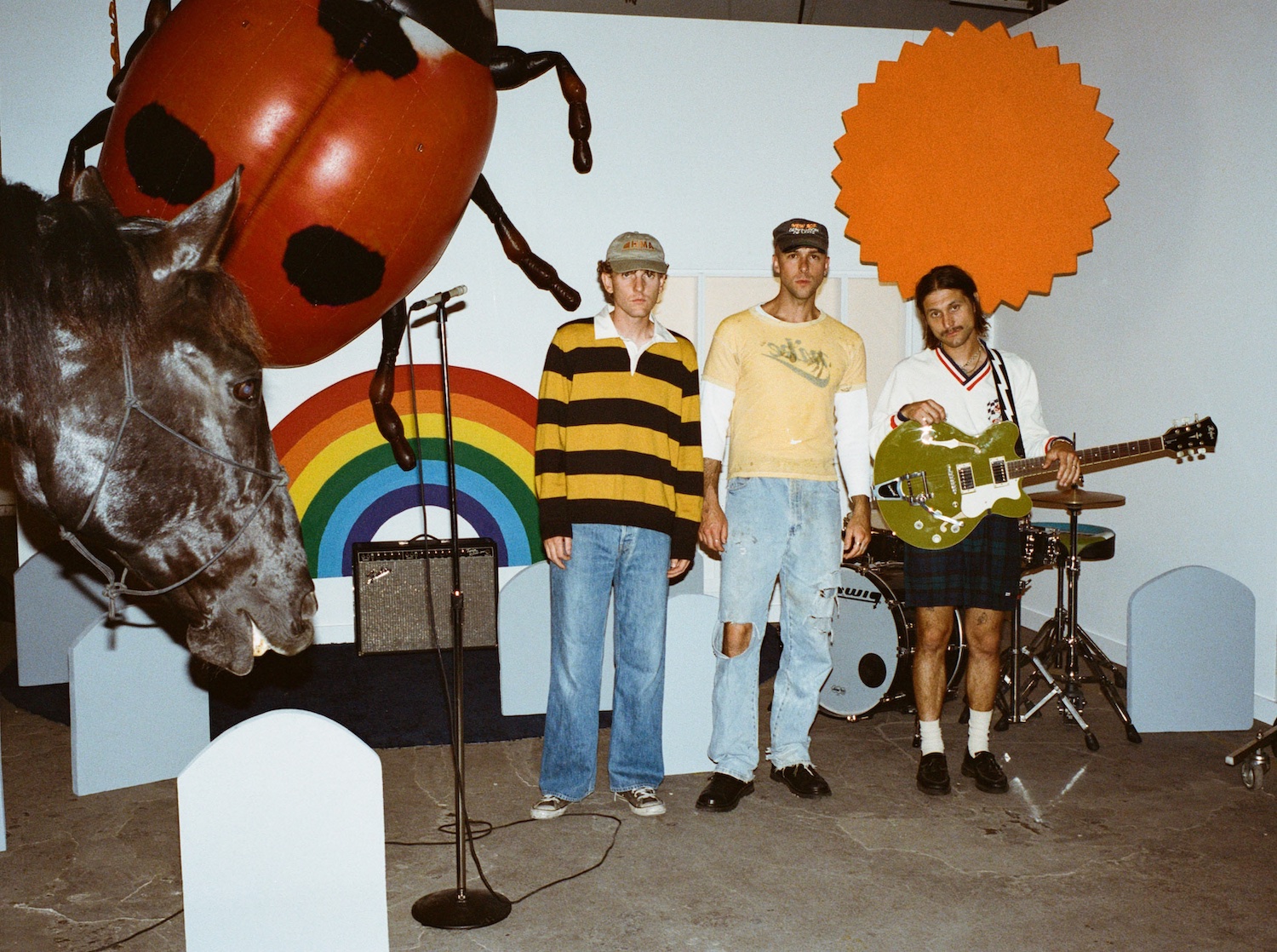
It’s never too late to be who you want to be. Only you can count yourself out, only you can stand in the way of your true self and of your purpose and of what brings you fulfillment.
What are you most excited about bringing this album to the live context? Are you guys preparing already for it? What's that looking like for you?
Chase Lawrence: Yeah, we’re just starting rehearsals on Monday. Yeah, man, I am just so, gosh, I’m so excited to just like, we don’t need any tricks. It’s so fun to just, we started learning the songs and we play them once and we’re like, okay, that sounds good. So many times before it’s taken effort to kind of make the things reflect the way or feel a similar way that they feel on recording. And this has just been like, we just flipped the lights on and we’re like, oh, it’s ready to go.
So it’s so cool to bring exactly what the recording is to a live context is like, it’s the wildest feeling ’cause like it’s like, I can bring it to life in a way that even for me, it just feels like so electric. So I’m so excited for people to bring that extra bit of like, that variable that’s missing right now, it’s just people. So I think, I don’t know, as a viewer, I went to a show the other night and it was great. But it was just very much like, it was very programmed and it’s cool in its own way, but it’s just so fun for us to just be able to go up there and put our full truest self on display with no tricks.
It's really cool to be able to play that loose, because this is how you made the song. So you're just giving them to us just the way that we heard them the first time.
Chase Lawrence: Exactly.
Let's leave it on the spirit of paying it forward. Who are you listening to these days that you would recommend to our readers?
Chase Lawrence: This band called, bby, I really like that song “Kinky.” Let’s see, what else? I got back into the band Jet, the album Get Born. I really like that a lot. I like this band Snooper, I don’t know where they’re from exactly, but it’s just nice that they’re kind of popular in Nashville right now.
I haven’t been listening to a ton of music recently, but what’s the song? This band Wishy, I like them too. I don’t know if you’ve listened to them, but I love that song, “Love on the Outside.” So let’s go with those; it’s good, relevant alt music.
— —
:: stream/purchase I’m Not Afraid of Music Anymore here ::
:: connect with COIN here ::
Stream: “Bloodtype” – COIN
— — — —

Connect to COIN on
Facebook, Twitter, TikTok, Instagram
Discover new music on Atwood Magazine
© Phoenix Johnson
:: Stream COIN ::

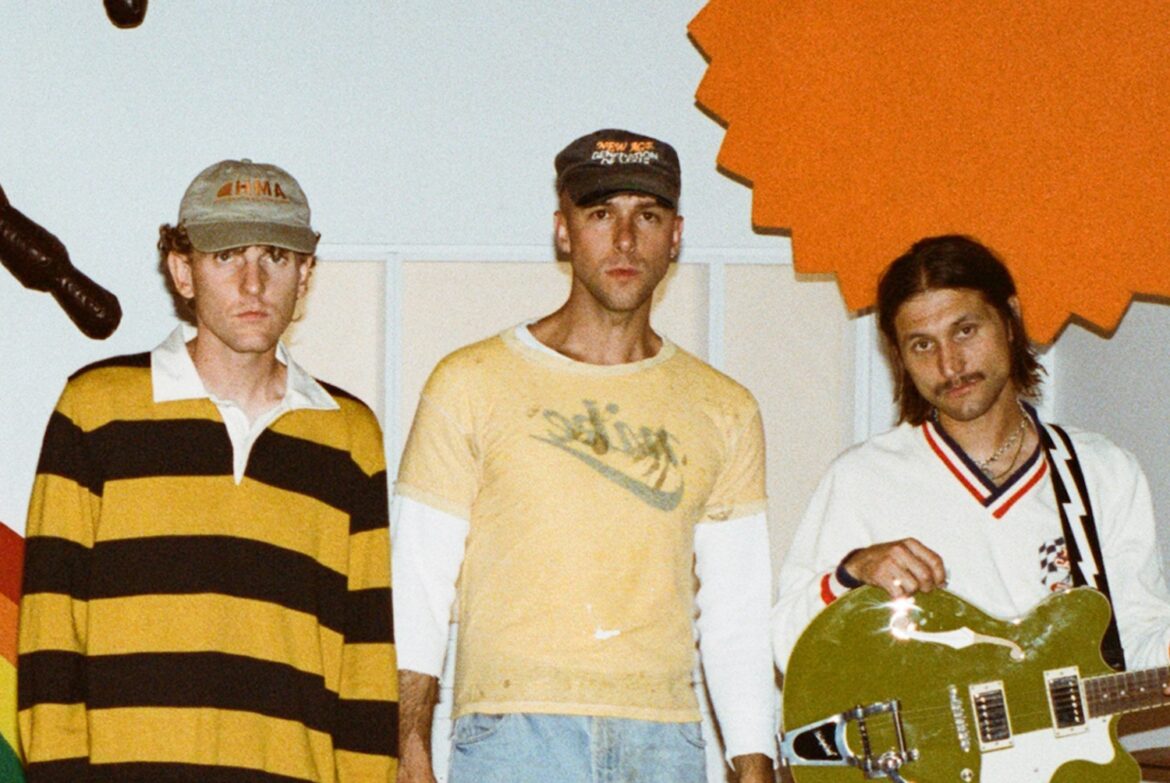
 © Phoenix Johnson
© Phoenix Johnson